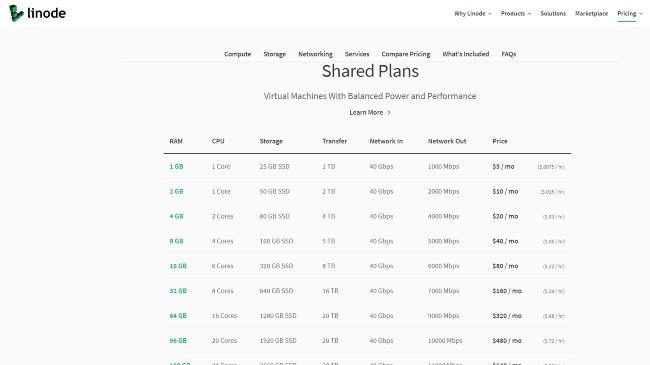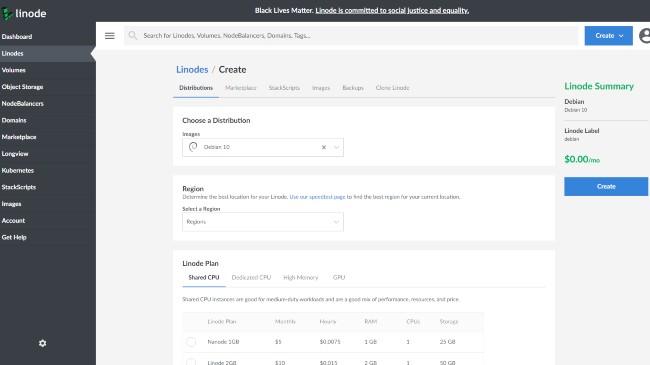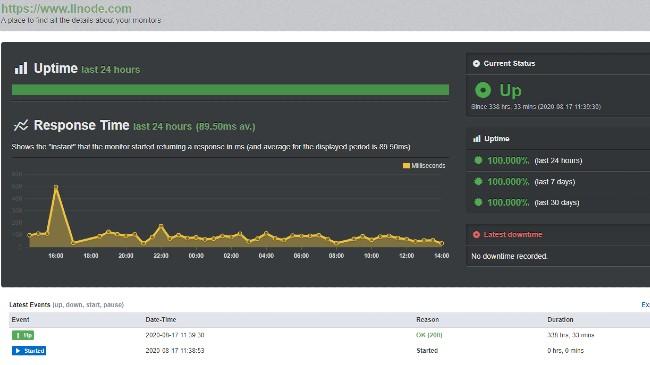Linode is a US-based web hosting provider that was founded in 2003, specifically geared towards developers, especially those with a strong Linux background. The company offers excellent service at bargain prices and bills on an hourly basis, but they can be far too complicated to use for customers who are not particularly tech savvy.
Linode claims they are the largest independent open cloud provider, with 11 markets and more than 800,000 customers in 196 countries. They’re based in the US in Philadelphia, Pennsylvania, launched in 2003 by Christopher Aker, who was looking for a way to make cloud computing less complicated and more accessible to a wider audience - but still mostly focused on developers. The company adds that a part of their customer-oriented philosophy is also the fact that they have no outside investors.
- Want to try Linode? Check out the website here
The name itself is a portmanteau of Linux and node. The company has received a Stevie Award for Sales and Customer Service. Currently, they have 11 data centers all over the world: four in the USA and one each in the UK, Japan, Singapore, Germany, Canada, India, and Australia. They offer speed tests for each of these so customers can choose which service works for them.

Pricing
Linode approaches pricing in a different way to most providers: instead of offering a small number of plans with predefined features, users can choose between 10 different plans to tailor to their needs.
The cheapest plan starts at $5 per month and includes 1GB RAM, 1 CPU core, 25GB SSD storage, 1TB network transfer, 40Gbps Network In (received traffic), and 1000 Mbps Network Out (sent traffic). These features steadily increase with each subsequent plan.
Linode handles billing on an hourly basis, meaning you can switch between plans as much as you like and only pay for what you actually used.
Users can pay with cards or PayPal, but they will still have to add a cart to their account to use PayPal. They offer $100 promotional credit that you can use within 60 days before they charge your card at all, plus a 7-day money-back guarantee.
Ease of use
If you want to make use of the promotional $100 when first opening an account with Linode, you’ll have to sign up from the page of the offer, and they will automatically add a promotional code to your sign up form. You’ll need to give your name, address, and card information to create an account. We got a confirmation email with a couple of beginner’s guides that walk you through the whole setup process.
Cloud Manager login is simple enough as it uses the username and password you set while creating your account. From there, the “Getting Started with Linode” guide, linked in your welcome email, explains the rest of the process in a simple-to-follow format. Although it does a great job of simplifying the process, you still need to have some technical know-how to find your way around. You can choose your region, plan, and set a password (or add an SSH key for extra security).

To host a website on Linode, you’ll have to choose between a number of web servers, which include Apache, Nginx, and Lighttpd. Linode offers a guide on how to install and use each of these. There is no control panel as such, but you’re free to install one if you’d like (you’ll have to purchase any licenses for it separately from Linode, as they don’t offer that). For uploading your website, you’re free to choose any file transfer program with the SFTP standard, including Filezilla, for example. The provider also offers a step-by-step guide to installing WordPress, complete with the necessary code.

Speed and experience
Linode’s main website performed surprisingly average on our GTmetrix speed test. It took 7.2 seconds for the website to fully load - the average being 8.3 seconds - and a whopping 150 requests, which is close to double the average 89.
When it comes to uptime, Linode is surprisingly tight-lipped, making no promises anywhere on their website. However, their service remains excellent, as our two-week-long uptime test showed: we recorded absolutely no downtime at all. There were some minor spikes in response time, but since the average was 89.64ms, which is incredibly low, they can be safely ignored.
Support
Linode offers several ways for users to get the assistance they need. When it comes to using their services, their guides offer in-depth explanations of a vast number of potential areas of interest. Their Professional Services team is also there to help when it comes to site migrations, software deployments, optimizations, etc.
You can chat with Linode through their IRC Channel, email them, give them a phone call, or open a support ticket. Their Community section is also immensely helpful, with forum posts from users about a wide variety of different issues. It seems to be well-staffed, as most questions are answered in-depth within a day or so, either by Linode employees or other community users. It is, however, not terribly active, with an average of 2-3 posts a day.
The competition
Both DigitalOcean and Linode are geared towards developers and offer promotional credit, but the former does not offer any refunds. When it comes to pricing, for shared plans, their prices are identical.
Cloudways is the halfway point for users who want all the perks of Linode without the know-how, as the provider offers middleman management of Linode (and other cloud hosting platforms, including DigitalOcean). But be prepared to pay significantly more: the Linode plan that goes for $5/mo directly through them costs $12/mo with Cloudways.
For users who are looking for reliable, fast providers that are more beginner-friendly, Hostgator is an excellent alternative. However, Linode is cheaper in the long run, especially thanks to the flexibility of their prices.
Bluehost is another cheap, easy-to-use alternative to Linode, but their US-based data centers offer significantly less flexibility in terms of location. Additionally, Bluehost charges significantly more after your first three years with them, while Linode has no hidden charges.
Final verdict
Linode is an excellent choice for developers and those who are at home with Linux. For complete beginners, the learning curve might be too steep, so Bluehost and Hostgator both offer products that are easier to understand and work with. But for those who know what they need and how to get it, Linode is among the best they can get.
- Best overall web hosting services
- Best WordPress hosting providers
- Best cloud hosting providers
- Best Linux web hosting services
- Best e-commerce hosting
- Best dedicated server hosting
- Best small business web hosting
- Best Windows hosting services
- Best managed web hosting
- Best green web hosting
- Best business web hosting
- Best colocation hosting
- Best email hosting providers
- Best VPS hosting providers
- Best web hosting resellers
from TechRadar - All the latest technology news https://ift.tt/32z2Fs0
via IFTTT
0 التعليقات: